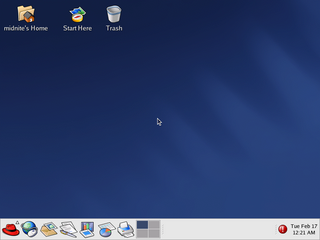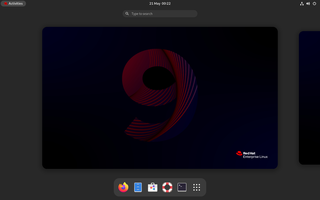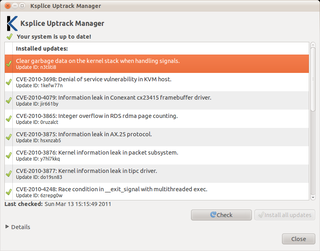A fedora is a type of hat.
Contents
Fedora may also refer to:
A fedora is a type of hat.
Fedora may also refer to:

A Linux distribution is an operating system made from a software collection that includes the Linux kernel and often a package management system. They are often obtained from the website of each distribution, which are available for a wide variety of systems ranging from embedded devices and personal computers to servers and powerful supercomputers.

Red Hat Linux was a widely used commercial open-source Linux distribution created by Red Hat until its discontinuation in 2004.

Security-Enhanced Linux (SELinux) is a Linux kernel security module that provides a mechanism for supporting access control security policies, including mandatory access controls (MAC).

The Yellowdog Updater Modified (YUM) is a free and open-source command-line package-management utility for computers running the Linux operating system using the RPM Package Manager. Though YUM has a command-line interface, several other tools provide graphical user interfaces to YUM functionality.
The Fedora Project is an independent project to co-ordinate the development of Fedora Linux, a Linux-based operating system, operating with the vision of "a world where everyone benefits from free and open source software built by inclusive, welcoming, and open-minded communities." The project's mission statement is to create "an innovative platform for hardware, clouds, and containers that enables software developers and community members to build tailored solutions for their users". The project also oversees Extra Packages for Enterprise Linux, a special interest group which maintains the eponymous packages. The project was founded in 2003 as a result of a merger between the Red Hat Linux (RHL) and Fedora Linux projects. It is sponsored by Red Hat primarily, but its employees make up only 35% of project contributors, and most of the over 2,000 contributors are unaffiliated members of the community.
up2date, also known as the Red Hat Update Agent, is a tool used by older versions of Red Hat Enterprise Linux, CentOS and Fedora Core that downloads and installs new software and upgrades the operating system. It functions as a front-end to the RPM Package Manager and adds advanced features such as automatic dependency resolution. The file /etc/sysconfig/rhn/sources specifies where up2date will search for packages.

Red Hat Enterprise Linux (RHEL) is a commercial open-source Linux distribution developed by Red Hat for the commercial market. Red Hat Enterprise Linux is released in server versions for x86-64, Power ISA, ARM64, and IBM Z and a desktop version for x86-64. Fedora Linux and CentOS Stream serve as its upstream sources. All of Red Hat's official support and training, together with the Red Hat Certification Program, focuses on the Red Hat Enterprise Linux platform.

The Discordian or Erisian calendar is an alternative calendar used by some adherents of Discordianism. It is specified on page 00034 of the Principia Discordia.
Exec Shield is a project started at Red Hat, Inc in late 2002 with the aim of reducing the risk of worm or other automated remote attacks on Linux systems. The first result of the project was a security patch for the Linux kernel that emulates an NX bit on x86 CPUs that lack a native NX implementation in hardware. While the Exec Shield project has had many other components, some people refer to this first patch as Exec Shield.
Technical variations of Linux distributions include support for different hardware devices and systems or software package configurations. Organizational differences may be motivated by historical reasons. Other criteria include security, including how quickly security upgrades are available; ease of package management; and number of packages available.
BioLinux is a term used in a variety of projects involved in making access to bioinformatics software on a Linux platform easier using one or more of the following methods:

Fedora Linux is a Linux distribution developed by the Fedora Project. It was originally developed in 2003 as a continuation of the Red Hat Linux project. It contains software distributed under various free and open-source licenses and aims to be on the leading edge of open-source technologies. It is now the upstream source for CentOS Stream and Red Hat Enterprise Linux.

Liberation is the collective name of four TrueType font families: Liberation Sans, Liberation Sans Narrow, Liberation Serif, and Liberation Mono. These fonts are metrically compatible with the most popular fonts on the Microsoft Windows operating system and the Microsoft Office software package, for which Liberation is intended as a free substitute. The fonts are default in LibreOffice.

In computing, SystemTap is a scripting language and tool for dynamically instrumenting running production Linux-based operating systems. System administrators can use SystemTap to extract, filter and summarize data in order to enable diagnosis of complex performance or functional problems.

Ksplice is an open-source extension of the Linux kernel that allows security patches to be applied to a running kernel without the need for reboots, avoiding downtimes and improving availability. Ksplice supports only the patches that do not make significant semantic changes to kernel's data structures.

RPM Package Manager (RPM) is a free and open-source package management system. The name RPM refers to the .rpm file format and the package manager program itself. RPM was intended primarily for Linux distributions; the file format is the baseline package format of the Linux Standard Base.

Russian Fedora Remix was a remix of the Fedora Linux Linux distribution adapted for Russia that was active in 2008–2019. It was neither a copy of the original Fedora nor a new Linux distribution. The project aimed to ensure that Fedora fully satisfied the needs of Russian users with many additional features provided out of the box. In autumn 2019 the project was phased out because its leaders announced that it "had fulfilled its purpose by 100%" and all of the Russian-centric improvements were officially included in Fedora repositories, and Russian Fedora software maintainers became regular Fedora maintainers.
Fedora Linux is a popular Linux distribution developed by the Fedora Project. Fedora attempts to maintain a six-month release schedule, offering new versions in May and November, although some releases have experienced minor delays.

The GPL font exception clause is an optional clause that can be added to the GNU General Public License permitting digital fonts shared with that license to be embedded within a digital document file without requiring the document itself to also be shared with GPL. Without the clause, conflicts may arise with open-source projects distributing digital fonts which may be used in desktop publishing. As explained by Dave Crossland in Libre Graphics Magazine: "A copyleft font may overreach into the documents that use it, unless an exception is made to the normal terms; an additional permission to allow people to combine parts of a font with a document without affecting the license of texts, photographs, illustrations and designs. Most libre fonts today have such a copyleft license – the SIL OFL or GNU GPL with the Font Exception described in the GPL FAQ."

DNF or Dandified YUM is the next-generation version of the Yellowdog Updater Modified (yum), a package manager for .rpm-based Linux distributions. DNF was introduced in Fedora 18 in 2013; it has been the default package manager since Fedora 22 in 2015, Red Hat Enterprise Linux 8, and OpenMandriva, and is also an alternative package manager for Mageia.